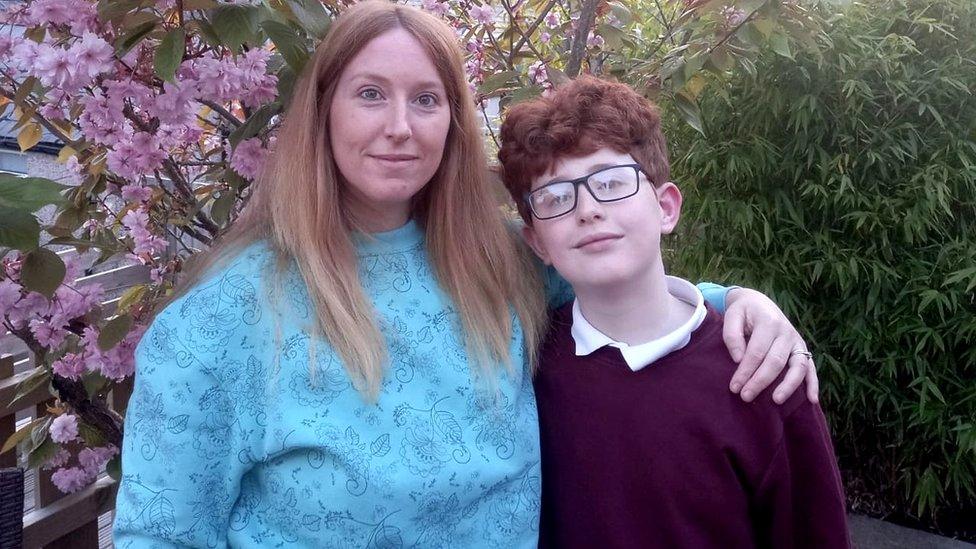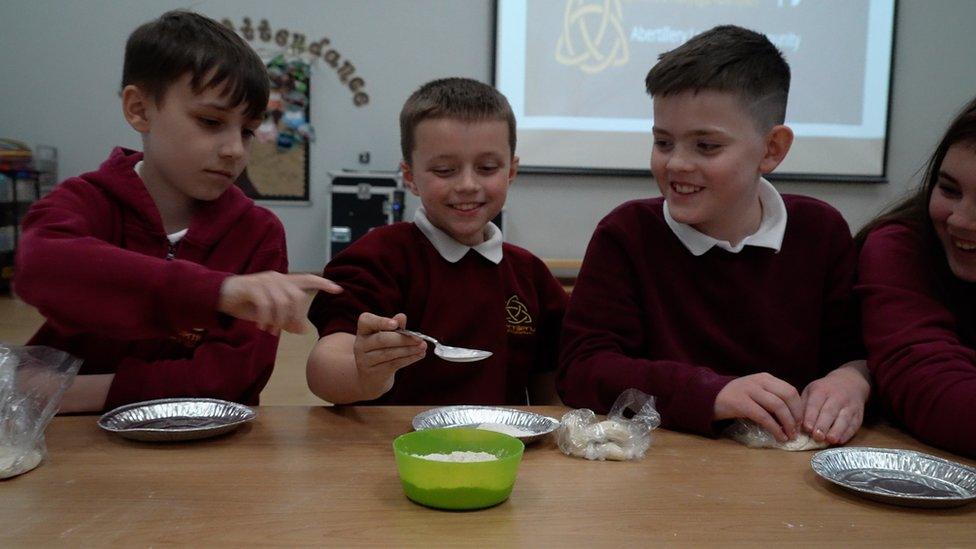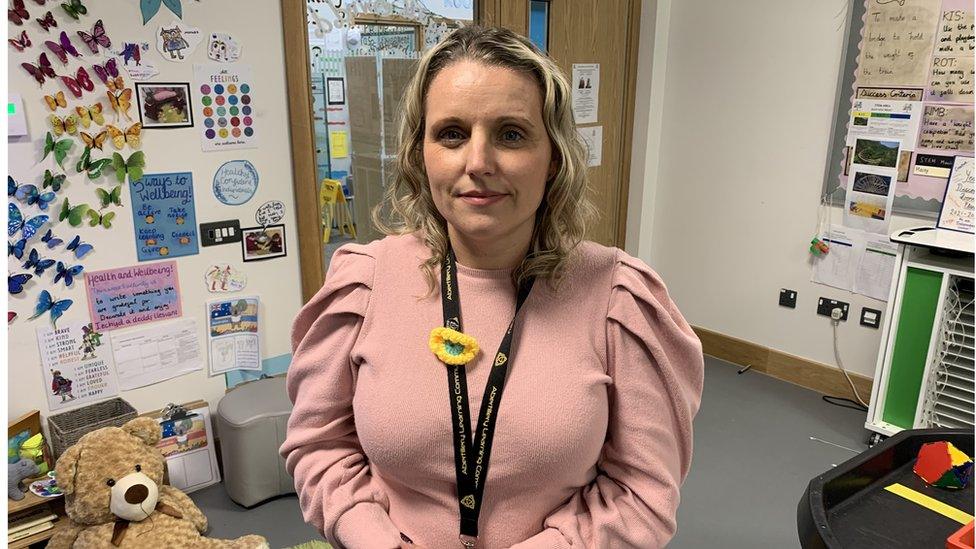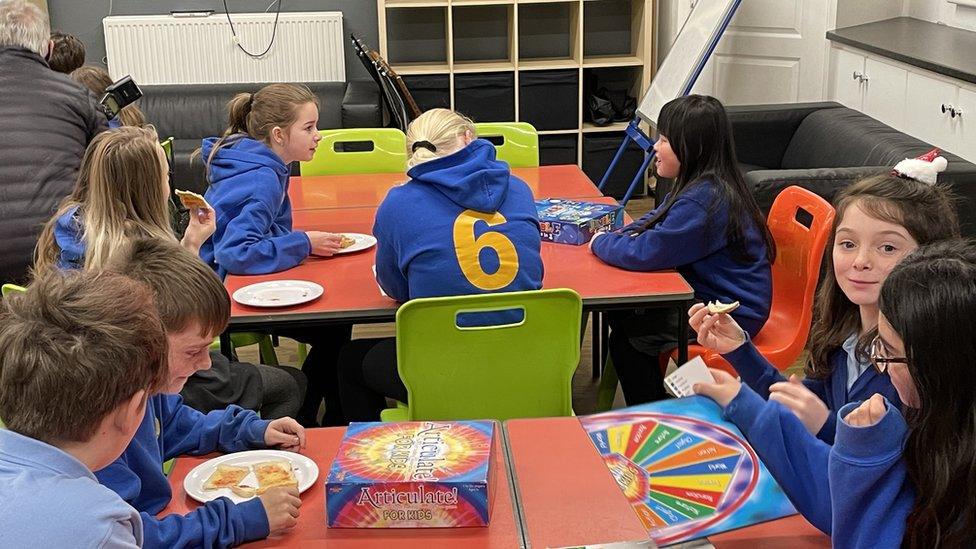Longer school day: Wales pupils learn new skills
- Published
A longer school hours trial saw children learning new skills such as cooking and pottery
One mum said it was "fantastic" having her child stay one extra hour in school, but could it soon catch on across Wales?
In January, 14 schools experimented with extending the school day in a 10-week long experiment.
The pilot followed a Welsh government pledge to look at reforming the school day and school year.
Ten-year-old William, from Abertillery, said he "really enjoyed" the extra time, and wanted it to continue.
While pleased, his mum Lucy is unsure whether extending the pilot to all pupils is feasible and said it can make pick-ups of more than one child difficult.
So at the end of the 10-week experiment, what did parents and school staff make of it?
Building relationships
The schools involved could decide how to schedule the five hours extra a week.
Abertillery Learning Community, in Blaenau Gwent, decided that children in years five and six could stay on after class from 15:10 to 16:10.
Activities included martial arts, dance, cookery and drumming and were mostly run by outside groups from the local community.
Staff were offered the opportunity to take part in running the sessions and 14 took up the offer including teachers and teaching assistants.
Abertillery Learning Community is a school for children aged three to 16 and is spread over four sites, three of which were involved in the pilot. It meant offering 150 sessions over the 10-week trial period.
The school says the focus was on pupils' well-being and offering the chance for them to build relationships after missing out over the pandemic.
'It's a different thing to look forward to every day'

William found out that he was a fan of martial arts thanks to being given the chance to try it for the first time
William has been staying on in school for the extra hour every day apart from Wednesdays, and martial arts is his favourite activity.
"It was a skill I never knew I enjoyed and now we did the after school club and we had a chance to do it I now know that I like it," he said.
"Usually in school we have set things that we do every day like the maths and the literacy but with the after school clubs it's a different thing to look forward to every day.
"Having my friends there was an extra bonus."
Was he tired? "Not really, actually," he answers.
"I think it really should carry on because I really did enjoy it."
'It's been really good in lots of ways'

Lucy, with her son William, works as a mobile hairdresser, so could still manage school pick-up times with the longer school day
William's mum Lucy believes the idea behind the pilot is "fantastic", but is unsure whether it would be feasible to extend it to all pupils.
"He absolutely loved it," she says.
"It's been really good in lots of ways because he's been with all his friends.
"He's had an opportunity to try new things he hasn't tried before and yeah, I think it's given them all a boost actually."
Some families struggle to pick up from after school clubs, but Lucy is a mobile hairdresser so she was able to work around new pick-up times.

Cookery classes proved very popular with many of the pupils
Her younger son Oliver was not part of the pilot which at times meant the "minor inconvenience" of "a double pick-up".
"I would love for it to continue, as would William and I know my youngest Oliver would also love an opportunity to try it," Lucy added.
However, she questioned the cost and practicality of offering it to all pupils and questioned whether every area would have enough groups locally to run activities.
"I think the viability of rolling it out to every child in every class across Wales does seem a bit of an undertaking to be honest."
'Staff have had to be flexible'

Carrie-Anne Williams says the extra sessions put on for the children provided a rewarding experience
Carrie-Ann Williams, a business support officer at the school, took on the "huge" task of scheduling the extra sessions.
"It has been really tough just to ensure that each campus has the same provision and that each session is covered every day of the week," she said.
"We've had a lot of issues with Covid as well and some of the providers haven't been able to turn up for the session so the staff have had to be flexible and jump in and run some of the sessions themselves."
Unions have been worried about what reform of the schools day could mean for school staff.
Out of the norm
But she said at Abertillery staff liked that they could opt in or out, and the extra pay they received meant they could "earn a little extra per week especially with the rising cost of living".
Children were offered something "out of the norm, that they weren't used to and that some families can't afford".
She helped run a coding Lego club and as a result the school has bought extra resources so pupils in other year groups can try it too.
Cooking classes proved very popular. "It's been so rewarding to receive photos from parents of children making their own snacks at home," Carrie-Anne said.
Everyone involved has "enjoyed every minute of it" she said. But while it has "definitely" been worth the hard work, it has not been plain sailing.
Numbers for sessions were sometimes limited because of Covid risk assessments or the space required for cookery, for example.
Thirty places were available for each session for year five and six pupils, with numbers dipping on Fridays and towards the end of the 10 weeks.
"It was very high to start with, but we have seen them starting to dip, especially on Friday afternoons because the children want to go to the park and they want to go down their caravans."
Realistically, could it be rolled out to all pupils in the school and across Wales?
"No, I don't think so just because of the logistics and the space and the timings - I don't think we could accommodate it for all year groups," said Carrie-Anne.
'Not simply about longer days'
The Welsh government said there would be a "thorough evaluation" of the £2m trial when it comes to end in all pilot schools over the next month.
It would look at the effects on different groups of learners, the range of activities offered, the impact on and views of staff as well as the opinions of families.
A spokesman said initial feedback indicated a "very enthusiastic" response from the 1,800 learners who had taken part.
Unions have opposed the proposals and say schools already have too much on their plate introducing other reforms, including a new curriculum.
"This trial is not simply about longer days," the Welsh government said.
"We know that supporting learners to benefit from an extended range of activities, including arts and sports as well as social activities and academic programmes, can be good for attainment, well-being and wider relationships."
Changes to school terms are also being looked at which could mean an end to the long summer holiday.
The Welsh Conservatives said changing the school day had the potential to bring positive change for pupils but questioned the timing of the pilot with schools "still reeling from the pandemic".

WILD MOUNTAINS OF SNOWDONIA: Five farming families open their gates and share their lives
BROTHERS IN DANCE: The remarkable duo at the forefront of UK dance

Related topics
- Published9 December 2021
